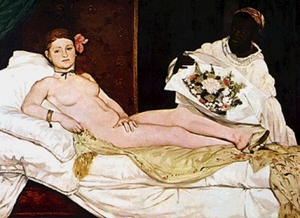This is an archive of the ArtCat Zine, 2007-2009. Please visit our new project, IDIOM.
The Modern and Manet at Bastille Day
The French Revolution, which we celebrate today, is often taken in tandem with the industrial revolution as marking the birth of the modern world. If this is the case, it stands that modern art was decidedly late to the party. Sixty-six years late, to be exact, if we take Manet’s Olympia as the first document worthy of the descriptor. Here’s T.J. Clark on the subject: “Something decisive happened in the history of art around Manet which set painting and the other arts on a new course. Perhaps the change can be described as a kind of skepticism, or at least unsureness, as to the nature of representation in art.” In this rendering, the modern revolution in art does not immediately seem to resonate with what we understand of the French Revolution, taken here as the modern revolution in politics - in either timing or content.
The argument could be made, certainly, that those shopkeepers, rentiers, artisans and journeyman who sacked the Bastille two-hundred and twenty years ago today were displaying a pointed skepticism towards the nature of representation in politics; but ‘unsureness’ doesn’t really capture the spectacle of the same dancing around Paris with the Governor’s head on a pike. Perhaps the comparison is fruitless, and ‘modern’ is best understood to be a mere chronological indicator, employed by different disciplines to recognize decisive moments in their respective histories, but irreducible to any common essence.
But then again, perhaps not; here is Edmund Burke on the French Revolution, it's worth reading with Olympia in mind: “But now all is to be changed. All the pleasing illusions that made power gentle, and obedience liberal, which harmonized the different shades of life… are to be dissolved by this new conquering empire of light and reason. All the decent drapery of life is to be rudely torn off. All the super-added ideas, which the heart owns and the understanding ratifies, as necessary to cover the defects of our weak and shivering nature… are to be exploded as a ridiculous, absurd, and antiquated fashion.” Here, perhaps, the resonance is not so hard to find, and Olympia’s specific nakedness becomes its own sort of head-on-a-pike.
Or maybe the essence of the modern, in terms of its constant refusal of the past, both in art and politics, is best captured by its most famous critic, himself inspired by the events we remember today. In his take the modern is marked by "everlasting uncertainty and agitation... (as) All that is solid melts into air, all that is holy is profaned, and man is at last compelled to face with sober senses, his real conditions of life, and his relations with his kind." Happy Bastille Day everybody.
ZINE
HOME
TIPS / COMMENTS
CATEGORIES
CONTRIBUTORS
- Greg Afinogenov
- B. Blagojevic
- Adda Birnir
- Susannah Edelbaum
- Julie Fishkin
- Paddy Johnson
- Jessica Loudis
- Christopher Reiger
- Andrew Robinson
- Peter J. Russo
- Blythe Sheldon
- S.C.Squibb
- Hrag Vartanian

